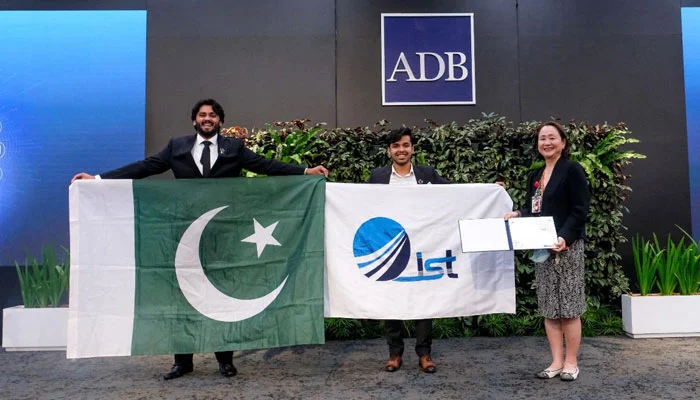ISLAMABAD In a groundbreaking achievement, two visionary students from Islamabad’s Institute of Space Technology (IST) have won Google’s Best AI Use Case Award at the Asia-Pacific (APAC) Solution Challenge 2025 for their revolutionary project, GeoGemma an open-source GeoAI model that simplifies complex satellite data using natural language prompts.
Developed by Ahmed Iqbal and Hanzila Bin Younas, GeoGemma seamlessly integrates a Large Language Model (LLM) with the Google Earth Engine, making it possible for users with no programming experience to analyze geospatial satellite imagery in real time. The duo received a $10,000 research grant from Google DeepMind, accelerating the model’s development and global recognition.
AI Meets Earth Observation
GeoGemma, short for Geospatial Gemma, leverages AI to translate user-friendly commands into geospatial analysis previously accessible only to experts. It draws from over 80 petabytes of satellite imagery on the Google Earth Engine, empowering users to perform tasks like environmental monitoring, urban planning, and disaster analysis without writing a single line of code.
Iqbal explained, “Most satellite tools demand heavy coding. We wanted to change that why not let people just ask questions in plain English and get powerful insights?”
From Final-Year Project to Global Recognition
The idea originated during their final year at IST, driven by a passion to merge GIS, Remote Sensing, and Generative AI. With support from the National Center of GIS and Space Application (NCGSA) during a pivotal summer internship, the duo gained early access to ChatGPT Pro and Cloud Sonnet tools, helping bring GeoGemma to life.
In mid-2024, the team applied for a research grant through the Gemma Academic Programme. Backed by Dr Sajid Ghuffar, they pitched their vision of merging Google Earth Engine with an open-source LLM, which led to the grant and international exposure.
Growing the Dream Team
As the competition intensified, Iqbal and Younas expanded the team—onboarding Abdullah Asif as Front-end Developer and Khalil Ur Rehman as AI Engineer. Their collective efforts propelled GeoGemma into the top 10 out of 750 entries across 200+ universities, ultimately winning the APAC award in Manila, Philippines.
The Challenge of AI Infrastructure in Pakistan
Despite global accolades, the team acknowledged a major limitation in Pakistan: the lack of AI infrastructure.
“You need massive GPU power to fine-tune models like ours. That’s a luxury we don’t have in Pakistan,” Iqbal noted.
Instead of a cash grant, Google DeepMind provided $10,000 in Google Cloud credits, allowing the team to fine-tune and train GeoGemma in a scalable and cost-effective manner.
Lightweight, Powerful, and Accessible
A key innovation of GeoGemma is its minimal size just under 2GB, meaning it runs on standard laptops without any external servers. This makes it ideal for researchers, students, and organizations with limited resources.
Future Plans and Industrial Applications
GeoGemma holds vast potential across industries like environmental monitoring, oil and gas, urban development, logistics, and climate resilience. The team plans to launch a public version of the software by the end of 2025, along with enterprise modules for advanced use cases.
Knocking on the Doors of Big Tech
Iqbal shared a message for fellow students: “Many of us don’t realize it, but if you have a great idea, reach out to Google, Amazon, Meta. You’d be surprised at what doors open when you knock.”
With eyes set on global partnerships and further innovations in Geo AI, the GeoGemma team stands as a beacon of hope for Pakistan’s AI and space technology ecosystem.



Comments (0)
No comments yet. Be the first to comment!
Leave a Comment